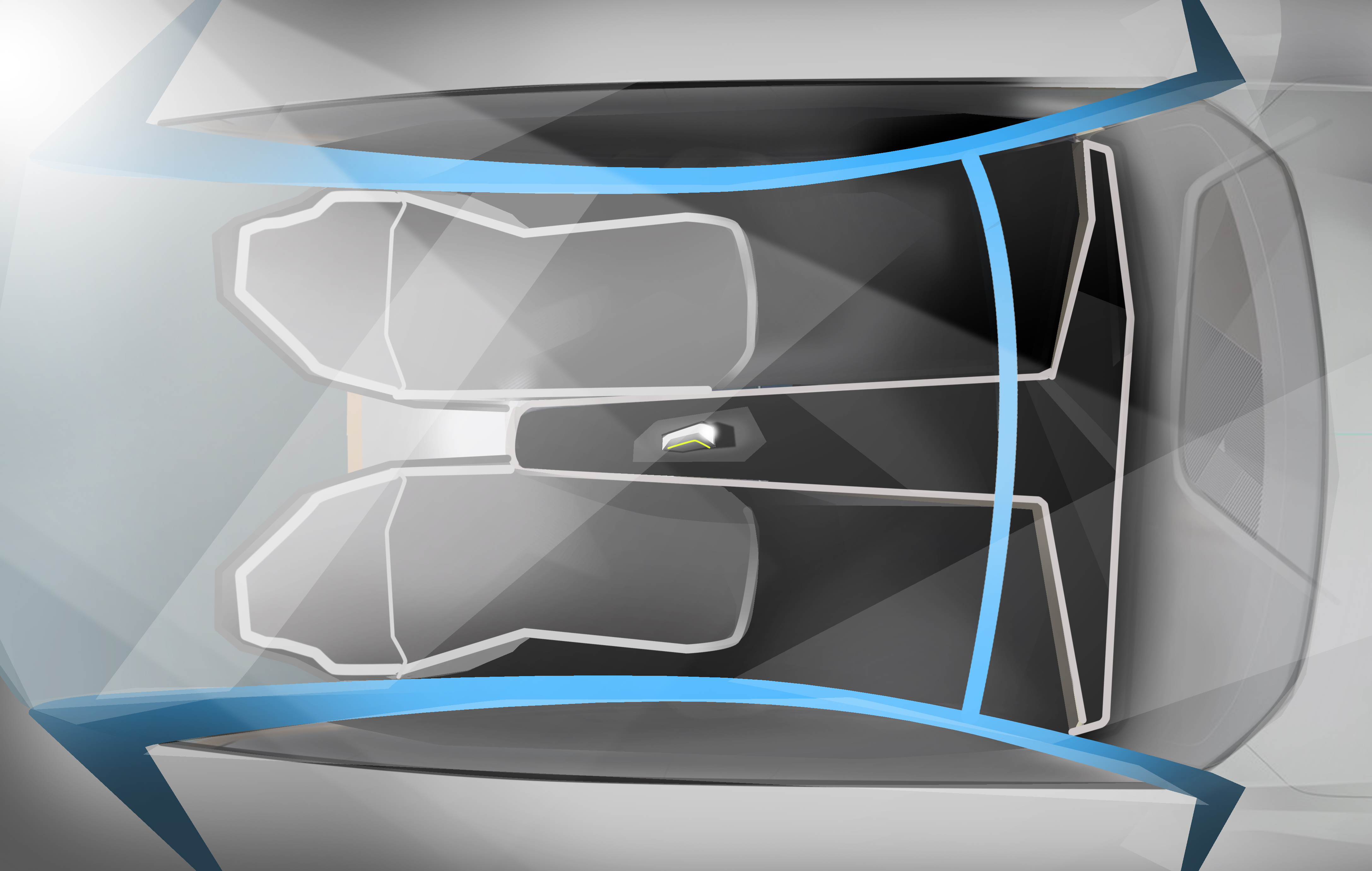»Vision PI« – Sustainable Mobility Concept of the Future with a Touch of Lifestyle
Flexible and Individual: Fraunhofer Team Develops Groundbreaking Vehicle Concept
How can individualized luxury mobility be designed for the world of the year 2040? A world that will be driven by the idea of a circular economy and products with significantly longer lives. A world that will also be characterized by the desire for individual and quickly evolving lifestyles. How can the maximum level of driving comfort be achieved between these two polar opposites? To answer these questions, an interdisciplinary research team made up of experts from the Fraunhofer Institute for Chemical Technology ICT, the Fraunhofer Institute for Surface Engineering and Thin Films IST, the Fraunhofer Institute for Industrial Engineering IAO, the Fraunhofer Institute for Manufacturing Technology and Advanced Materials IFAM, the Fraunhofer Institute for Machine Tools and Forming Technology IWU, and the Fraunhofer for Wood Research, Wilhelm-Klauditz-Institut, WKI, has developed »Vision PI«, a modular futuristic mobility concept.
What does mobility of the future look like? Researchers from six Fraunhofer Institutes have developed a groundbreaking vehicle concept that can be flexibly and individually designed depending on the intended use. The concept calls for a modular passenger cell, following the logic of a shell principle that can be flexibly adapted to the individual needs of the travelers: during the day, it serves as a communicative lounge; at night, it becomes a peaceful capsule for rest and recovery on long-haul trips. The interior can be adjusted flexibly and adapted in terms of settings. The materials used are made from renewable sources or are designed to optimize their ability to be reused or recycled. The entire module can be coupled with various mobility bases – with a vehicle platform, an air taxi, or a Hyperloop solution, depending on the need. It can also be transformed into an interactive virtual-reality lounge that enables limitless virtual travel around the whole world, thus contributing to an innovative component of new mobility and building designs.
»The foundation of our mobility concept is the autonomous, light, and personalized AllCell, which is compatible with various platforms. The AllCell can drive or fly, always under the power of the most efficient fuel,« explains Dr. Torben Seemann, who – in his role as the Head of Smart Matrix Production at Fraunhofer IST, one of the member institutes at the Fraunhofer project center in Wolfsburg – is playing a critical role in the development of the mobility concept. »Our concept is the luxury edition of individual travel. The exterior, interior, and information and communication technology are modular, customizable, and adaptive to the context. The interior of the AllCell can easily be modernized and is always on the cutting edge in terms of technology,« says Sebastian Stegmüller, Head of the Mobility Innovation Department at Fraunhofer IAO. Another special feature of the concept is the sustainable vehicle structure, which is divided into long-lasting reusable components and nondurable wear components, and design-relevant components. »The durable components are recycled after their end of life and reused in new vehicles. The nondurable parts are designed to achieve material recycling levels of nearly 100 percent,« explains Dr. Philipp Rosenberg, Group Manager of Lightweight Structures at Fraunhofer ICT.
Dennis Weintraut, research associate in the department of function-integrated lightweight construction at Fraunhofer IWU: »Our researchers from Fraunhofer IWU participate in this project with a holistic and sustainable production approach. In particular, we develop concepts for utilizing combined manufacturing processes and for their impact on design and construction, and for reuse of components made of hybrid materials. Processes developed in previous projects such as »FiberEUse« and »KomuPlex« are applied to this project to contribute to sustainable production, which implies circular economy. Not only do we emphasize the cost-efficient production of components, but we also want to make sure that these components can be refurbished for recovering materials, and even be reused in their old shape, if possible.«
Application-Oriented Idea
The innovative mobility concept was one of five recommendations taken by Fraunhofer to the #NEXTGen Moving Tomorrow Pitch, a competition of concepts organized by car manufacturer BMW. The competition is aimed at finding a »visionary, sustainable, and holistic complete concept for mobility in 2040.« Around the world, BMW had called on researchers from a total of ten renowned research institutes to submit recommendations that would improve the lives of future generations, are designed for the users, make cities smarter, or are meant to enable entirely new technologies. Fraunhofer was the only nonuniversity research institute that took part in the competition of concepts. Along with two teams from the elite Chinese Tsinghua University, the Vision PI team from Fraunhofer made it into the top three with its idea of an individual passenger cell.
»We are very pleased to have made it into the finals. Thanks to the interdisciplinary collaboration of the institutes, we managed to develop a concept that puts the focus on the users of the mobility of tomorrow. In doing so, our system solutions offer true added value for our customers,« explains Dr. Torben Seemann. The team behind the concept of Vision PI is convinced that its idea is appealing to the automotive industry. »That’s why we are continuing to pursue our concept with the objective of it being adopted and implemented by the automotive industry,« adds Sebastian Stegmüller.
- Fraunhofer Institute for Chemical Technology (ict.fraunhofer.de)
- Fraunhofer Institute for Surface Engineering and Thin Films (ist.fraunhofer.de)
- Fraunhofer Institute of Industrial Engineering (iao.fraunhofer.de)
- Fraunhofer Institute for Manufacturing Technology and Advanced Materials (ifam.fraunhofer.de)
- Fraunhofer Institute for Wood Research Wilhelm-Klauditz-Institut (wki.fraunhofer.de)
- #NEXTGen Moving Tomorrow pitch
 Fraunhofer Institute for Machine Tools and Forming Technology
Fraunhofer Institute for Machine Tools and Forming Technology